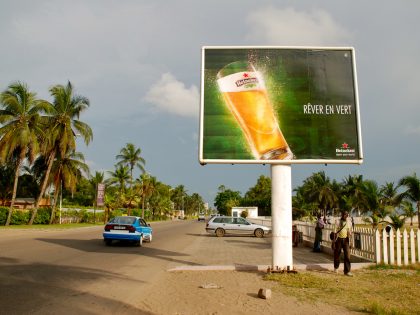
Is Heineken brewing a better Africa?
Multinational corporations are considered motors for development in Africa and the Dutch beer giant Heineken is often cited as one of the best examples. The reality is different and distressing.

Multinational corporations are considered motors for development in Africa and the Dutch beer giant Heineken is often cited as one of the best examples. The reality is different and distressing.

The German far right party AfD has extended its revisionism of German history to the colonial era.

“African corruption” is only African as regards its victims. Its perpetrators are institutions and individuals from across the globe.

The question is not how, or where, or when neoliberalism will end, but if it will, and what the left will do about it. The case of South Africa is instructive.

Urdang reflects her long friendship with fellow political exile Jennifer Davis, the anti-apartheid activist and changemaker.

The life of Lumumba advisor, Andree Blouin, offers lessons about the historically racialized and sexualized representations of women of color in politics.

Public sector strikes place major pressure on the Zimbabwean state, but not enough to effect a meaningful national dialogue on the country's direction.

A resurgent conspiracy theory that Nelson Mandela died in 1985 reveals the growing hopelessness in South Africa that rampant inequality is irreversible.

Nigerians’ anger and frustration are deservedly directed to their government. But few point to the special breed of Nigerians: the "Crazy Rich Nigerians."

The use of Evangelical Christianity to oppose progressive policies on sexuality education in schools is another example of Ghana’s march to the right.

Is western media’s mostly individualized focus on the Ugandan opposition figure Bobi Wine helpful to his movement?

Evan Mawarire became a leader against Mugabe and ZANU-PF’s oppression in Zimbabwe, but at what personal cost?

Centering African voices in a discussion so often dominated by non-African observers.

A response to the latest United Nations report on Zimbabwe’s food emergency.

South Africa introduces a new law which allows traditional leaders along with third parties to decide for communities, without their consent.

Turok, who died at 92, was committed to fighting for the ideals of the left in South Africa. It is worth reviewing what his contribution to these ideals were in the final chapter of his life.

In Nigeria, survivors of sexual violence and workplace sexual harassment know that facts are not enough.

It is time discuss food sovereignty in the Middle East and North Africa, again.

On the United Kingdom’s attempts to finance the construction of large-scale prison facilities in former colonies, to where it wants to deport undocumented migrants.

Prevailing thoughts on slums stress their transitory character, but the complexity of everyday life in slums, including how people manage survival, is lost in the way they are understood from the outside.